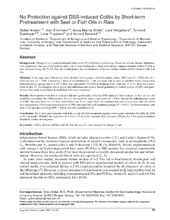| dc.contributor.author | Arslan, Gülen | en_US |
| dc.contributor.author | Erichsen, Kari | en_US |
| dc.contributor.author | Milde, Anne Marita | en_US |
| dc.contributor.author | Helgeland, Lars | en_US |
| dc.contributor.author | Bjørkkjær, Tormod | en_US |
| dc.contributor.author | Frøyland, Livar | en_US |
| dc.contributor.author | Berstad, Arnold | en_US |
| dc.date.accessioned | 2009-11-30T12:22:44Z | |
| dc.date.available | 2009-11-30T12:22:44Z | |
| dc.date.issued | 2007-04-30 | eng |
| dc.Published | Integrative Medicine Insights 2: 25-34 | en |
| dc.identifier.issn | 1177-3936 | |
| dc.identifier.other | http://www.la-press.com/no-protection-against-dss-induced-colitis-by-short-term-pretreatment-w-a216 | eng |
| dc.identifier.uri | https://hdl.handle.net/1956/3613 | |
| dc.description.abstract | Background: Omega-3 (n-3) polyunsaturated fatty acids (PUFAs) have modulating effects in several chronic infl ammatory conditions. The aim of the present study was to test whether prior short-term dietary supplementation with n-3 (fi sh or seal oil) or n-6 (soy oil) PUFA rich oils would protect the development of dextran sulfate sodium (DSS)-induced colitis in rats. Methods: Forty-eight male Wistar rats were divided into 6 groups: no intervention, sham, DSS, seal oil + DSS, fi sh oil + DSS and soy oil + DSS. Following 7 days of acclimatisation, 1 mL oil (seal, fi sh or soy) or distilled water (sham) was administered by gavage day 8 to 14. Colitis was induced by 5% DSS in drinking water from day 15 to 21. Rats were sacrifi ced on day 23. Histological colitis (crypt and infl ammation) scores, faecal granulocyte marker protein (GMP) and quantitative fatty acid composition in red blood cells were measured. Results: Pretreatment with fi sh or seal oils did not signifi cantly infl uence DSS induced infl ammation. In fact, all the oils tended to exacerbate the infl ammation. Soy oil increased the mean crypt score (P < 0.04), but not the infl ammation score or GMP. The ratio of n-6 to n-3 fatty acids (FAs) was 11 to 1 and 10 to 1 in standard diet and in red blood cells of control rats, respectively. Following administration of DSS, the ratio fell in all treatment groups (P < 0.001). The lowest ratios were seen in the groups receiving DSS + fi sh or seal oils (around 6 to 1). Conclusion: Short-term pretreatment with fi sh or seal oils did not protect against subsequent induction of colitis by DSS in this rat model. Whether the high ratio of n-6 to n-3 FAs in the standard diet concealed effects of n-3 FA supplementation should be further investigated. | en_US |
| dc.language.iso | eng | eng |
| dc.publisher | Libertas Academica | eng |
| dc.subject | Colitis | eng |
| dc.subject | Dextran sulfate | eng |
| dc.subject | Seal oil | eng |
| dc.subject | Fish oil | eng |
| dc.subject | Soy oil | eng |
| dc.subject | Ratio omega-6 to omega-3 | eng |
| dc.subject | Rats | eng |
| dc.title | No Protection against DSS-induced Colitis by Short-term Pretreatment with Seal or Fish Oils in Rats | en_US |
| dc.type | Peer reviewed | |
| dc.type | Journal article | |
| dc.description.version | publishedVersion | en_US |
| dc.rights.holder | Arslan et al. | |
| dc.identifier.cristin | 372757 | |
| dc.subject.nsi | VDP::Medisinske Fag: 700::Klinisk medisinske fag: 750::Gasteroenterologi: 773 | nob |
| dc.subject.nsi | VDP::Medisinske Fag: 700::Klinisk medisinske fag: 750::Reumatologi: 759 | nob |
